“Let me Google that for you.”
The name Google has become synonymous with searching the web, so it’s no surprise that it’s the website most people turn to when they want to find something on the Internet. In fact, the site, owned by a company called Alphabet Inc., has 91.19% of the market share in 2024.
Its popularity and market domination don’t necessarily mean it’s the best option for every search, though. In fact, there are many interesting alternatives to Google, and many of those stand out in their own way and bring something different to the table.
Here are 14 Google alternatives that you might want to consider, along with a few special features of each one.
1. Perplexity AI
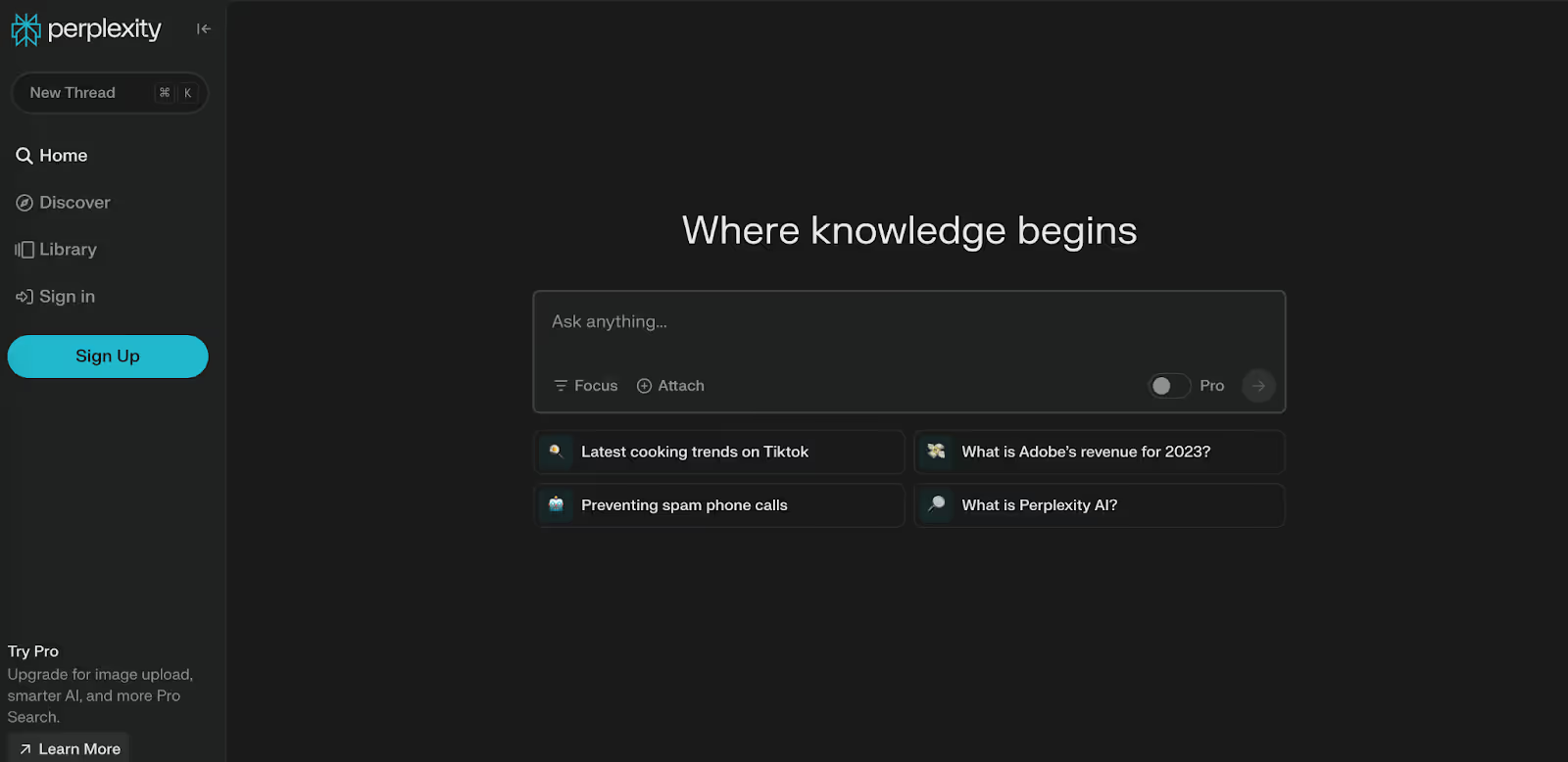
Perplexity AI is an AI-powered search engine available via the web or a mobile app. It provides an AI-generated answer to search queries, with source links included so you can visit the websites the information came from.
While the base version is free, you’ll need to upgrade to a paid version to gain access to additional features including image generation and Copilot, a smart assistant that asks follow-up queries to give you better results.
Perplexity AI also lets you:
- Store historical searches if you sign up for an account.
- Focus a search on specific resources, such as academic sources or Reddit.
- Generate images based on your search (for users of the Pro version only).
Here’s what Perplexity AI looked like when we asked it, “What’s the best search engine?” The answer was simple and informative, and the linked citations offered helpful additional insight.
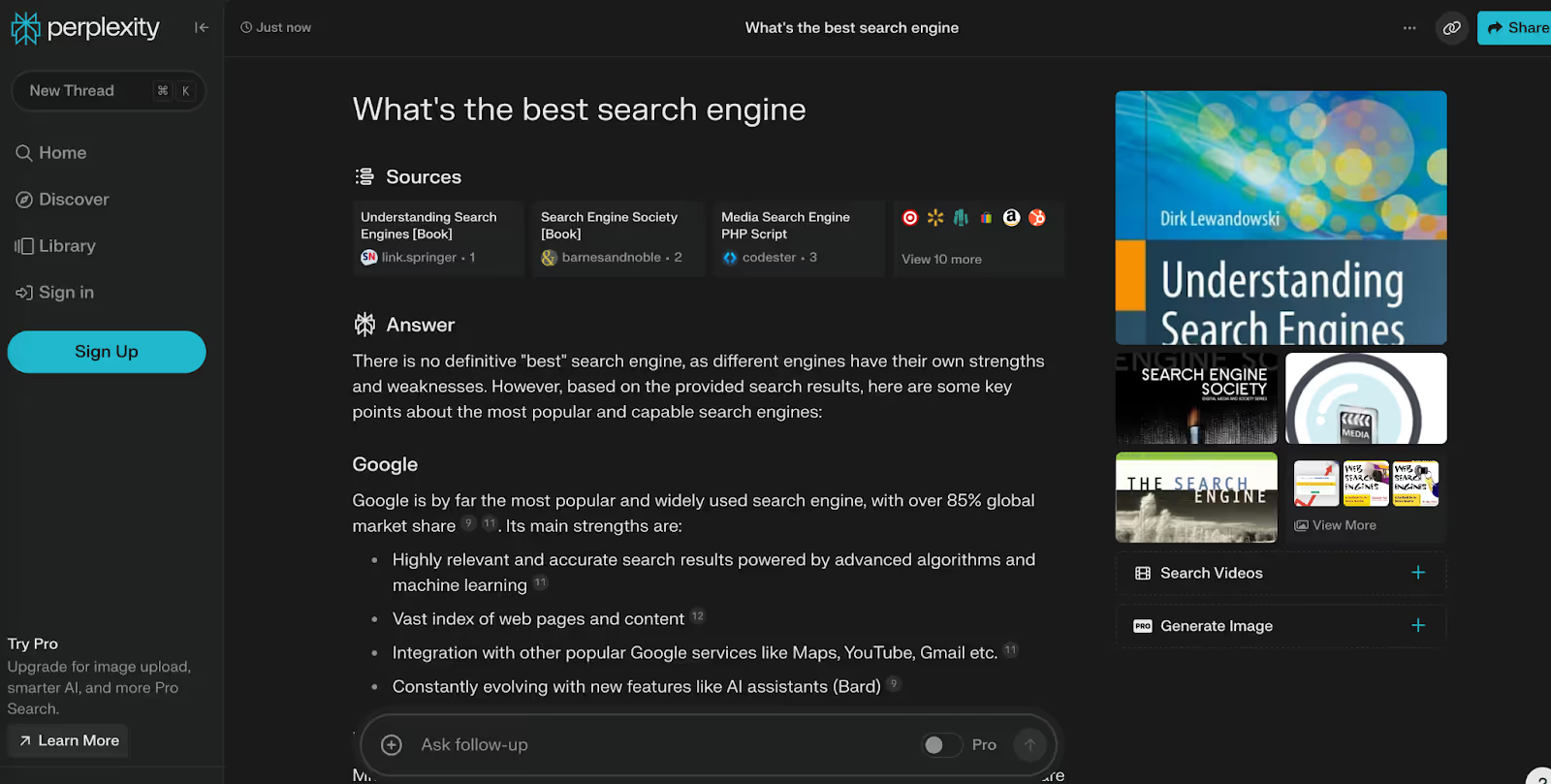
Many people have likened Perplexity AI to Google’s new AI Overviews, which provide AI-generated responses alongside source links at the top of search results. Moreover, the experience of sourcing within the response is similar to the functionality that OpenAI’s ChatGPT offers (for paid users).
2. DuckDuckGo
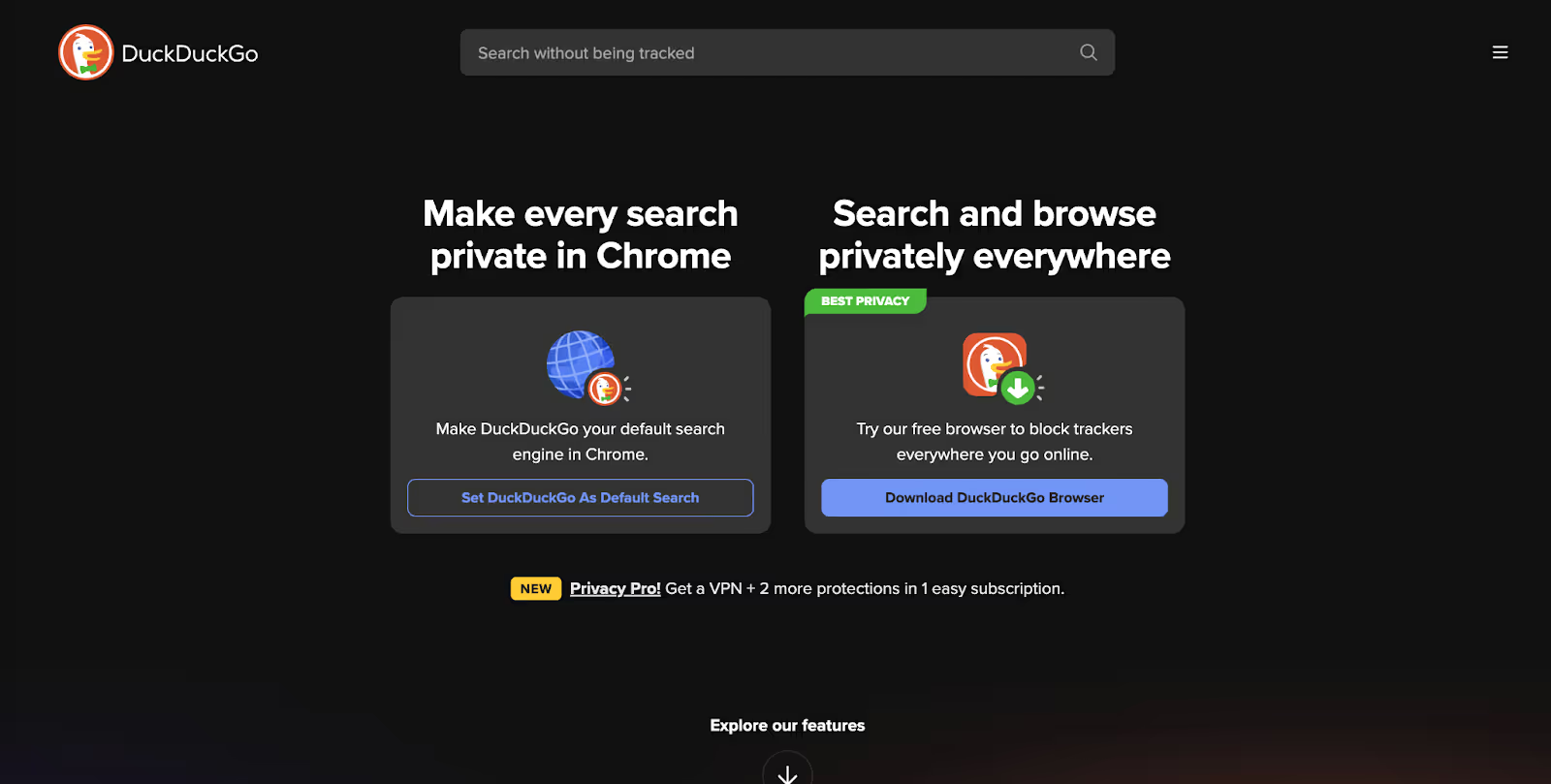
DuckDuckGo’s key feature is privacy. Its layout and search features are similar to Google’s, and it serves up a list of webpages when you type in a query. Unlike Google, though, DuckDuckGo doesn’t collect all your personal details.
At the time of this writing, DuckDuckGo was the fifth most popular search engine by market share, with 0.69%, according to Statista. It’s worth noting that DuckDuckGo largely relies on Bing to provide its traditional links and image data. In other words, you’re largely going to get Bing’s search results, but on a platform more focused on privacy. This is a good and bad thing, as DuckDuckGo was recently rendered unavailable by an upstream outage from Microsoft.
DuckDuckGo:
- Does not save your IP address or unique identifiers when you conduct a search.
- Doesn’t log IP addresses.
- Doesn’t create a personalized search history or deliver personalized ads.
- Blocks other trackers.
The search engine also offers:
- Instant answers, which are quick responses to specific queries generated from more than 100 sources. You won’t have to click on a webpage to get the information.
- Bang syntax, which allows you to directly search specific sites from within DuckDuckGo by adding an exclamation point (!) before the name of the site. For example, you could search Amazon.com for sweaters by typing in “!amazon sweaters.”
Here’s what DuckDuckGo looked like when we asked it, “What’s the best search engine?”
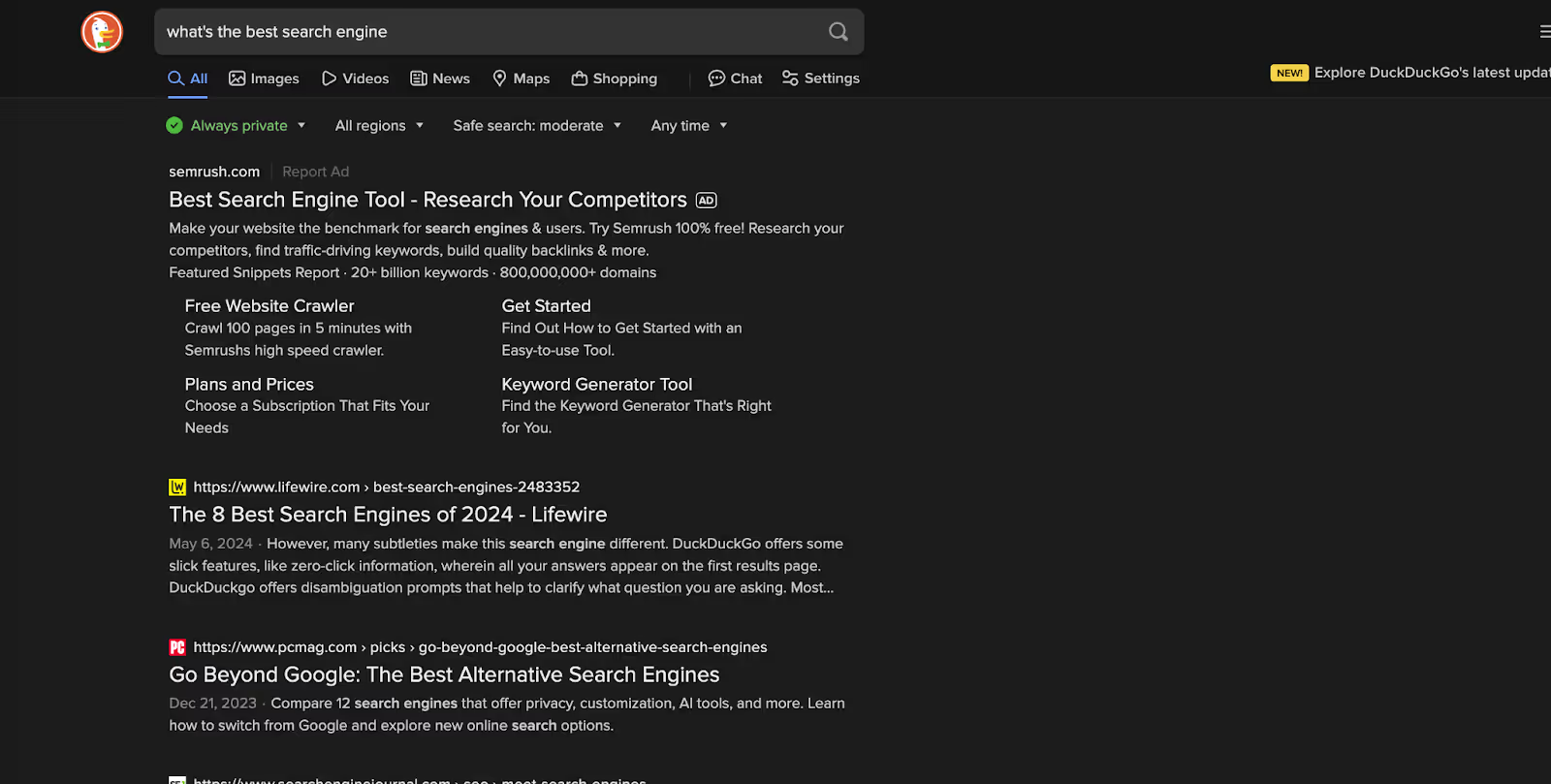
3. Bing

Bing has the second-largest market share, after Google, according StatCounter, which reports that Bing has a 3.64% market share. Like Google, Bing offers the ability to search both images and text. It also serves up ads, and its privacy policy is very similar to Google’s. Moreover, within Bing search, there are a number of SERP features that are similar to Google’s, including featured snippets and related searches.
Since Bing is owned by Microsoft, which is a major investor in OpenAI, Bing offers AI search tools with its Copilot feature. Bing is integrated with OpenAI’s GPT-4, and it can respond to searches with summaries and answers.
Bing also offers other standout features including:
- Rewards: You can earn points by searching; these points are redeemable for gift cards, donations, and sweepstakes entries.
- Content generation: Bing can create other content such as emails or essays for you.
Here’s what Bing looked like in response to the query “What’s the best search engine?”
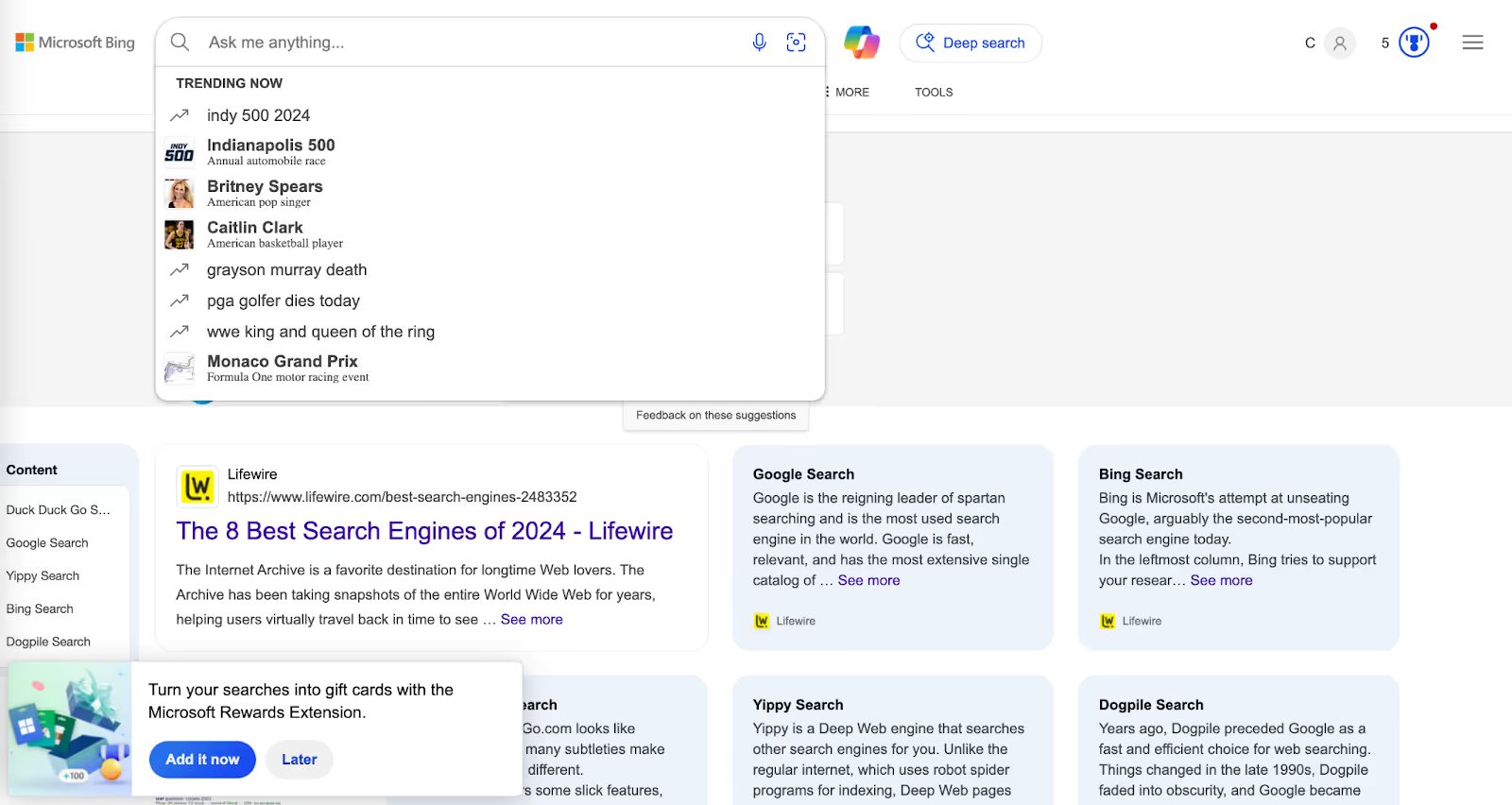
4. Brave
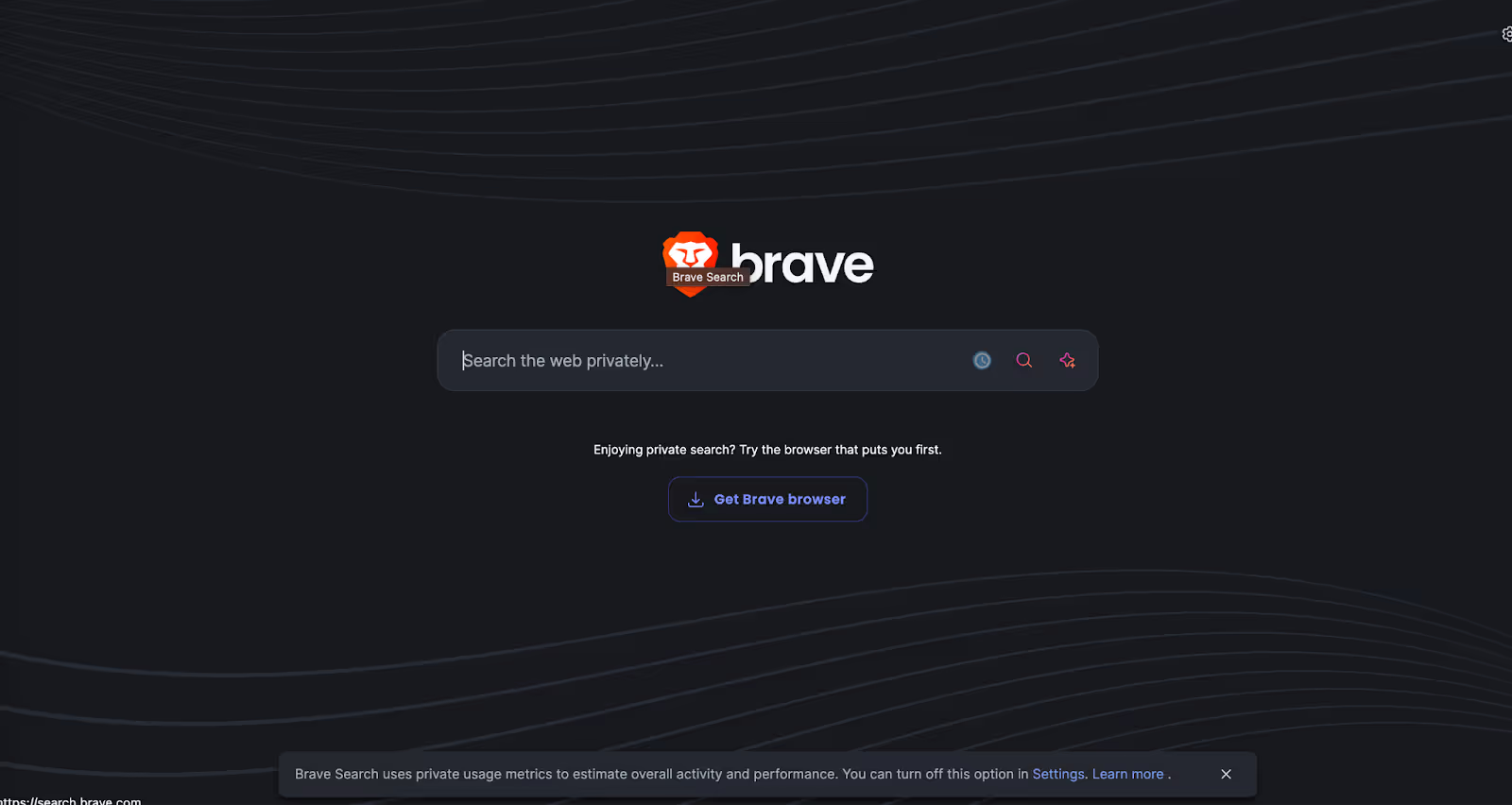
Brave is both a browser and a search engine, and its primary focus is privacy. Unless you turn Rewards or Sync on, Brave will not store a record of your browsing data, and it will not write any personal data to the blockchain. While it’s a newer search engine — launched only in 2021 — it’s been growing fast.
Brave uses its own search index rather than relying on Google, although it returns similar results, including a list of webpages in response to queries. Your results aren’t personalized, though, as Brave doesn’t reference your search history when responding to requests.
Brave also offers:
- Rewards when you support content creators by viewing ads. You’ll earn Brave Attention Tokens, which can be turned in for gift cards or exchanged for other currencies.
- AI summaries with citations
- Goggles feature that uses criteria you set to alter how pages are ranked when you perform a search.
Here’s what Brave looked like when asked, “What’s the best search engine?”
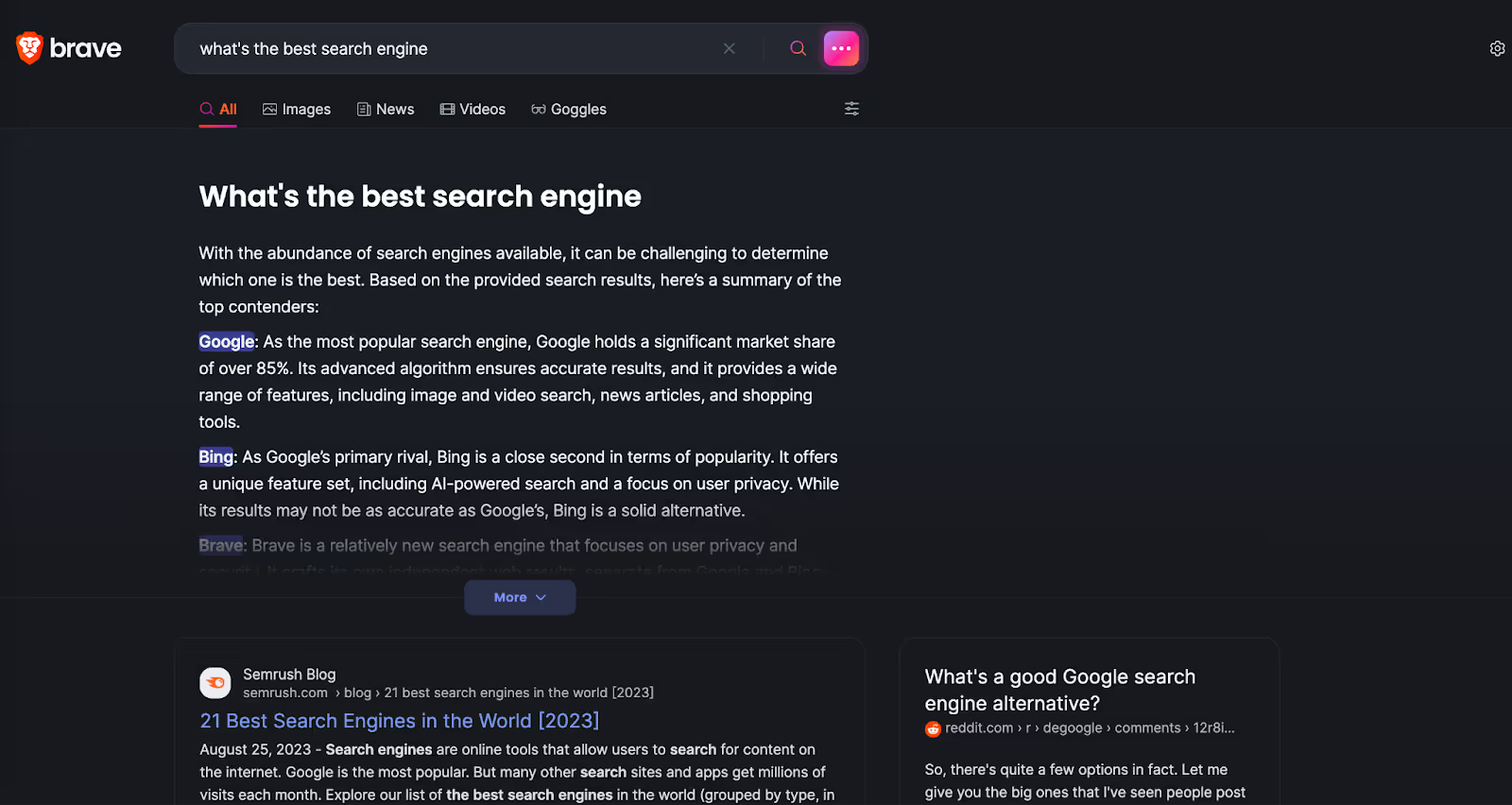
5. Yahoo

Yahoo actually predates Google, although it discontinued its own web crawler and relies on Bing to power its searches. It’s the third-largest search engine by market share, with 1.13%, and it also serves as a web portal offering news and other content.
Yahoo delivers results the same way Google does, with a list of webpage links you can click on to find the information you searched for. You can search by category, including news or images, or videos.
Key features of Yahoo include:
- An informative personalized homepage.
- An integrated email service.
- A relatively clean interface and easy navigation, as opposed to Bing, which is sometimes cluttered with too many SERP features.
Here’s what Yahoo looked like when we asked, “What’s the best search engine?”

6. Qwant
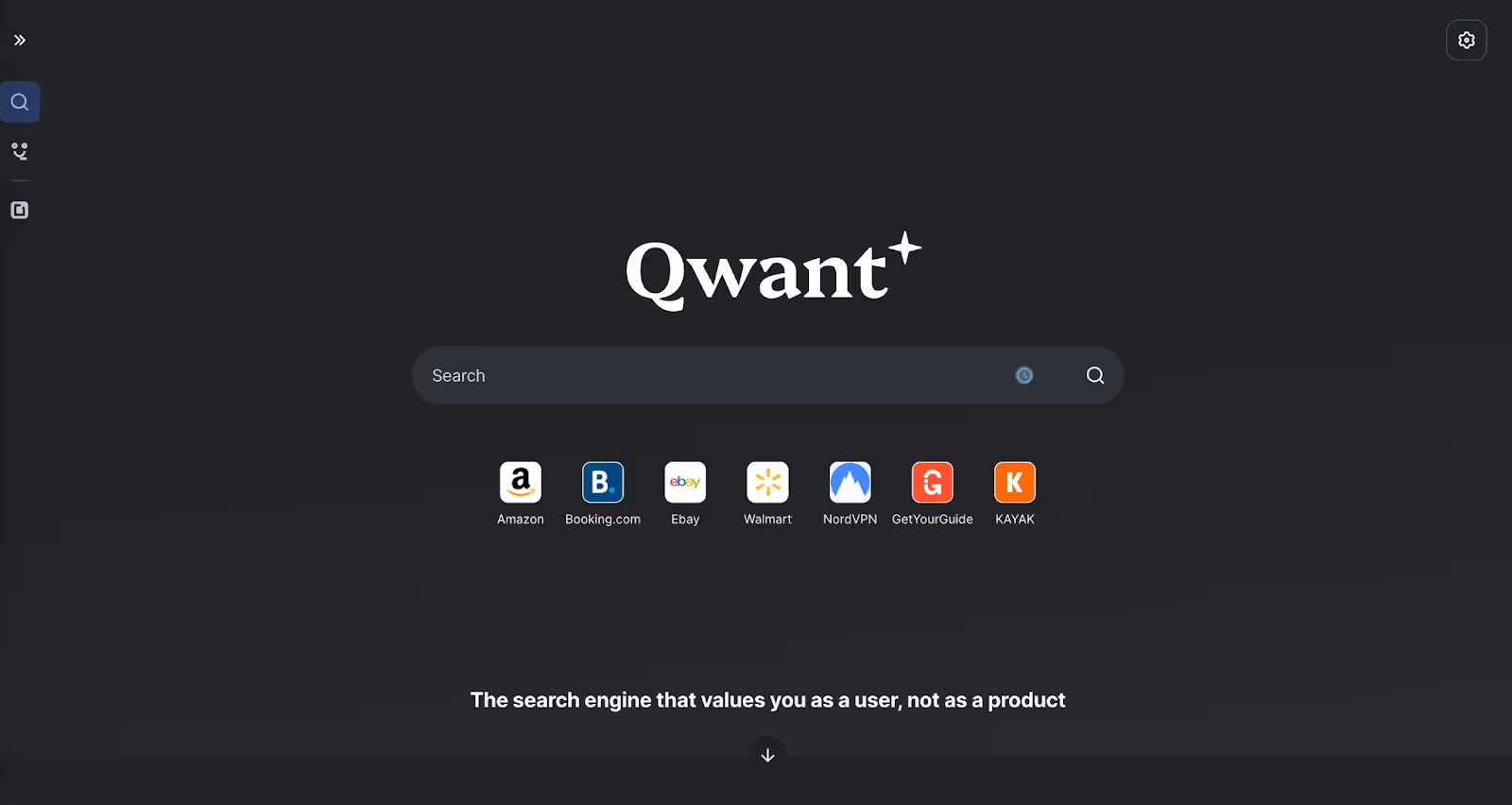
Qwant is another privacy-focused browser that does not store your search history or store or sell your personal data. Qwant searches are also encrypted.
Qwant is a French company. Its searches are powered by Bing, and it delivers results as a list of websites to click on, as Google does. There are three different interfaces to choose from:Search, Qwant Junior, and Maps. Qwant also offers an AI-powered summary for people who create and log into a Qwant account.
Standout features include:
- Maps with no tracking.
- Qwant Junior, which delivers child-safe content for children ages 6 to 13.
This is what Qwant delivered when asked, “What’s the best search engine?”
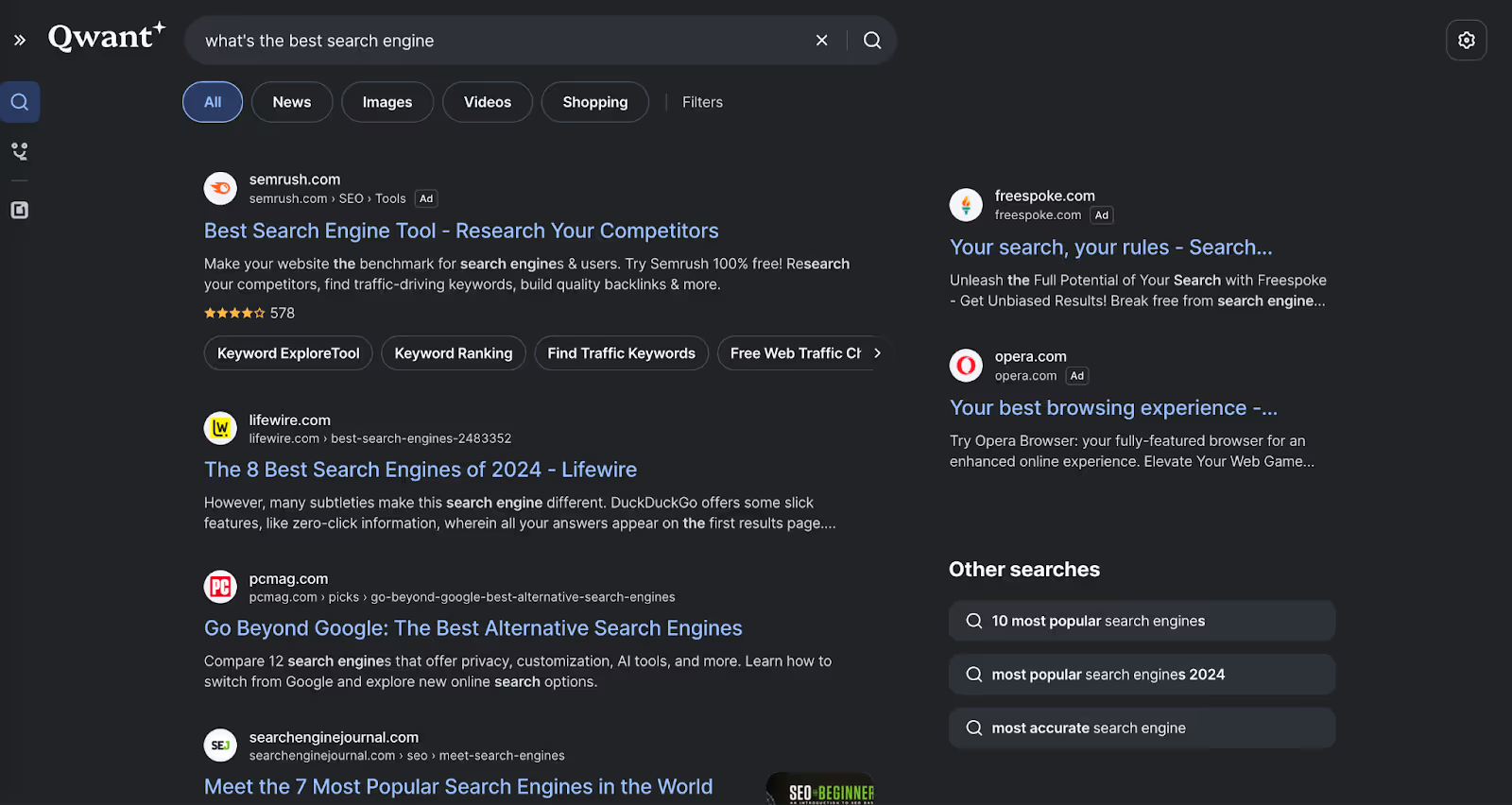
7. Swisscows

Swisscows is based in Switzerland and also prioritizes privacy. The company doesn’t store or collect email addresses, store or transmit any personal information, or collect any personal data. It does not use cookies, nor does it conduct geotargeting.
Bing powers Swisscows search results, except for searches in the German language, for which the company does its own indexing. Search results are family-friendly, with inappropriate content, including violent and NSFW content, filtered out. Here are some standout features:
- Having its headquarters in Switzerland means that the company is protected by solid privacy laws.
- It’s family-friendly.
- Swisscows offers translation powered by Yandex and a music search powered by SoundCloud.
Swisscows provided the following results when asked, “What’s the best search engine?”
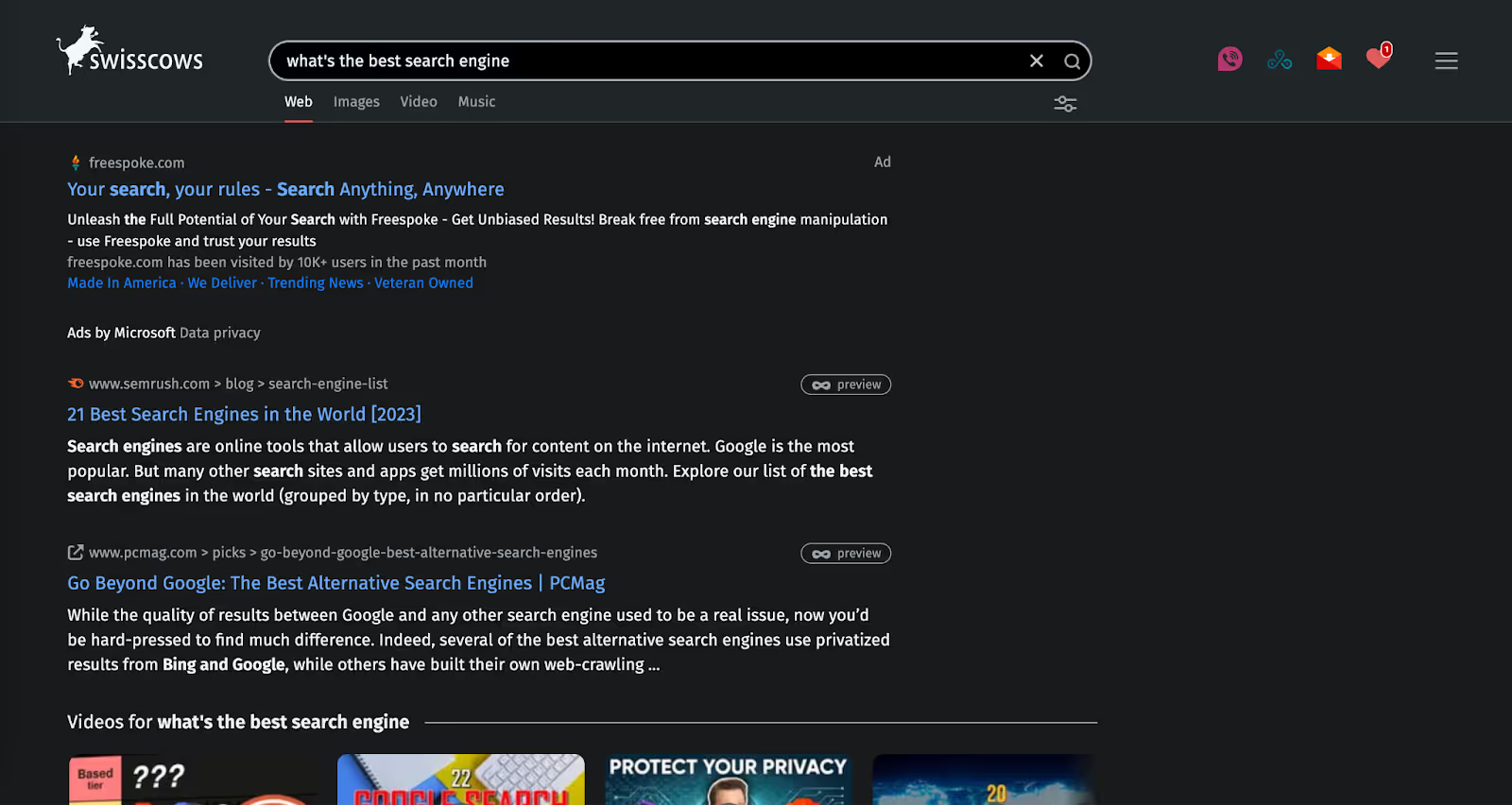
8. You.com

You.com is powered by AI, so you can get a summarized response to a question when you use the search engine. You also have the option to see a list of websites that provide information relevant to your search if you click on the All feature in the top corner of the screen.
You.com relies on Bing to power its searches, despite having its own website crawler. You can choose between a personal mode, which offers more customization, and a private mode, which ensures that You.com collects none of your data.
Special features of You.com include:
- AI summaries and content creation.
- The ability to store your search history by creating an account.
You’ll need to pay for the professional version, YouPro, to take advantage of all features, including unlimited queries.
This was You.com’s response to the question “What’s the best search engine?”

9. Ecosia
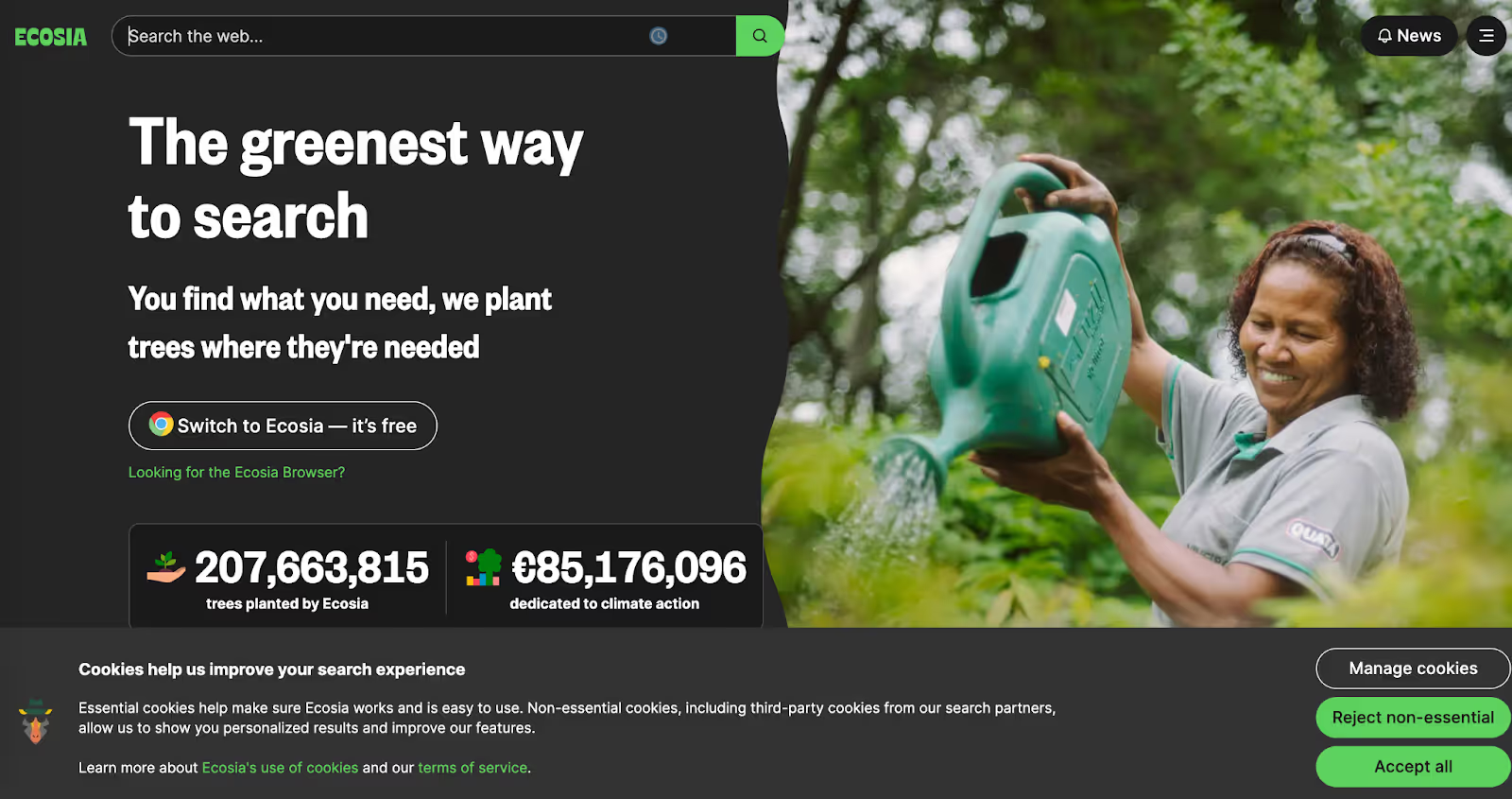
Ecosia’s biggest selling point is that it’s focused on saving the planet. Based in Germany, Ecosia dedicates all of its profits to green initiatives.
Ecosia uses Bing and Google to power its searches and ads, and it offers access to an AI chatbot powered by ChatGPT. It displays results in a similar way to Google’s results, as a list of websites, but it uses symbols including a green leaf icon and a fossil fuel plant icon to help search engine users quickly distinguish between green companies and companies that have been deemed climate destructive.
Ecosia’s standout features include:
- Powering the environmental movement with your searches.
- More than 200 million trees planted by the company.
Here’s how Ecosia responded to the question “What is the best search engine?”

10. Komo Search

Komo offers AI-generated answers to your searches, as well as links to websites where you can go for more information. You can ask Komo follow-up questions, which the site actually suggests when you input your first query.
There are no advertisements on the site, and you can either use the free version or upgrade to Komo Premium for a minimum price of $8 per month to access unlimited AI searches and more than 300 research mode queries.
Standout features include:
- Research mode.
- “Explain a Concept” feature that provides a detailed explanation of your chosen topic with sources cited.
This was what Komo delivered when asked, “What is the best search engine?”
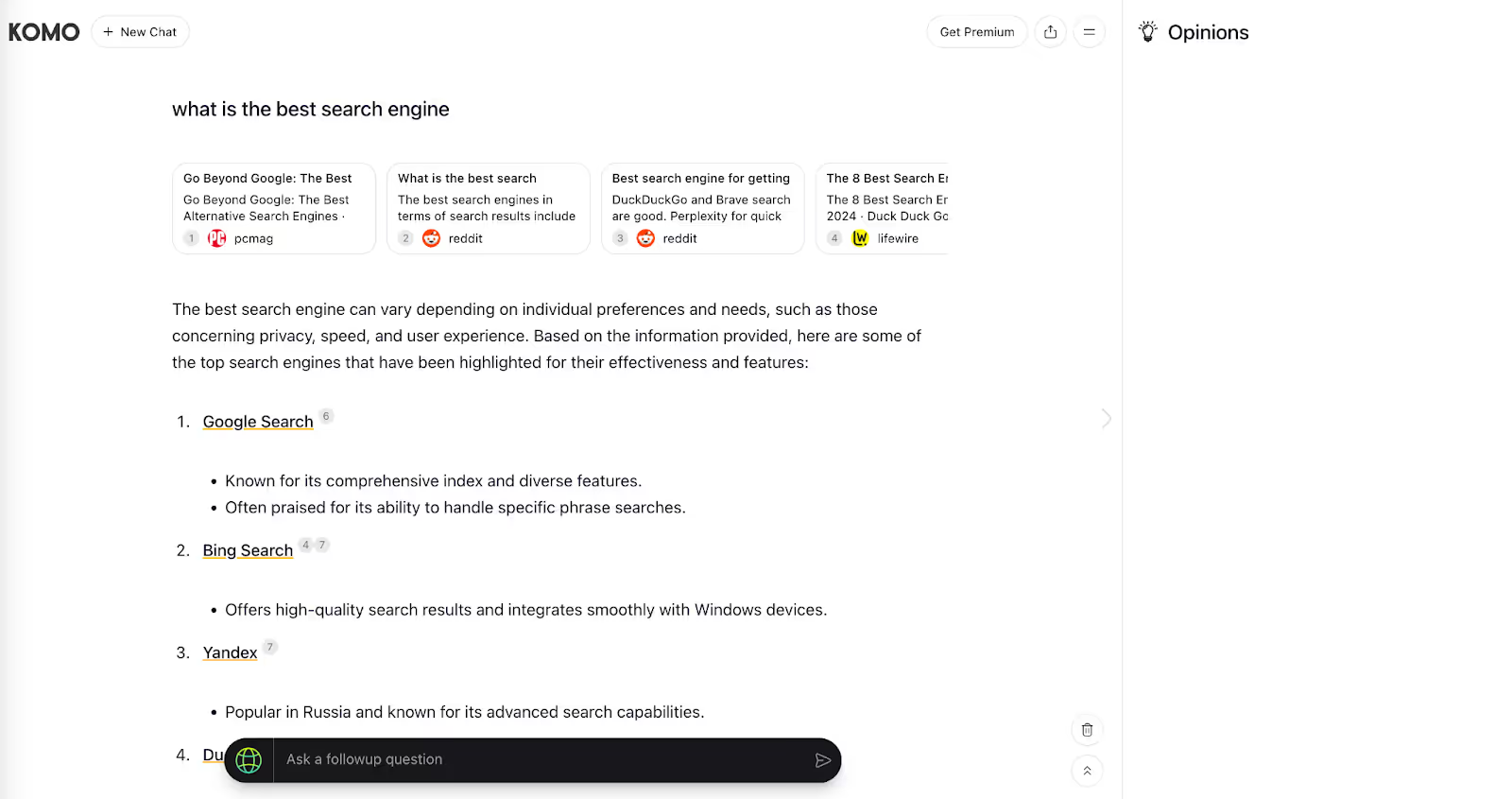
11. giveWater

giveWater is a charitable search engine with a focus on providing clean water to people who need it. Search results are powered by Bing and are displayed as a list of links, similar to a Google SERP.
Stand out features include:
- Providing clean water.
- A portion of profits are distributed to charitable partners.
These were giveWater’s results when asked, “What is the best search engine?”
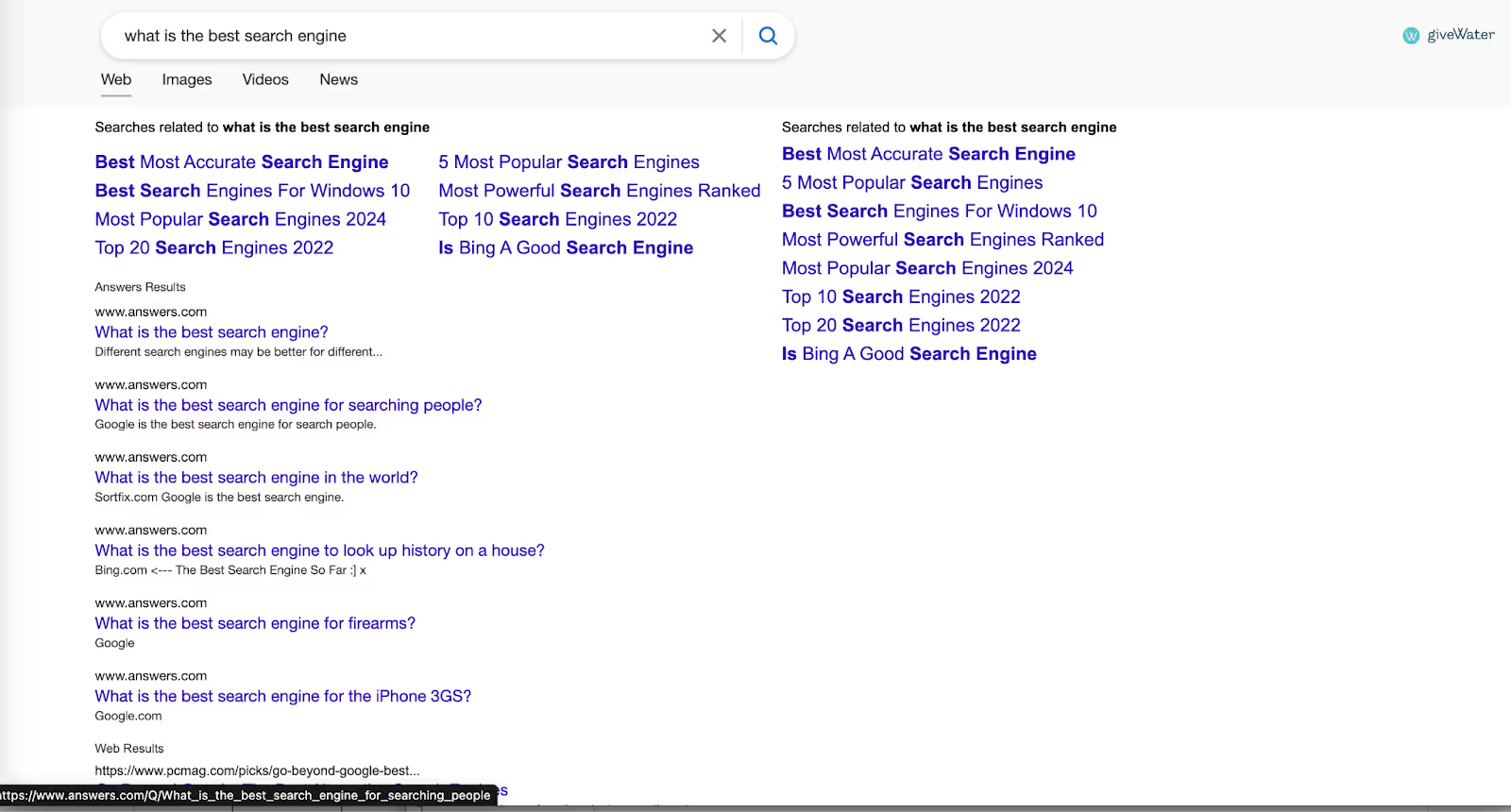
12. WolframAlpha

WolframAlpha provides you with answers, rather than a list of website pages, when you conduct a search. It’s powered by algorithms, a knowledge base, and AI technology. It performs mathematics, science, and technology functions, including unit conversions. It also offers insight into society, culture, and everyday life.
You can opt for natural language input or math input with WolframAlpha, and you can choose to upgrade to pro versions for educators, experts, or the general public. Pro versions enable you to upload your own data, create customized interactive visuals for downloads, and access more computational power.
Standout features include:
- The ability to perform complex calculations.
- Expert-level answers to queries.
- Complex search process with a bit of a learning curve.
WolframAlpha provided this response to the question “What is the best search engine?”
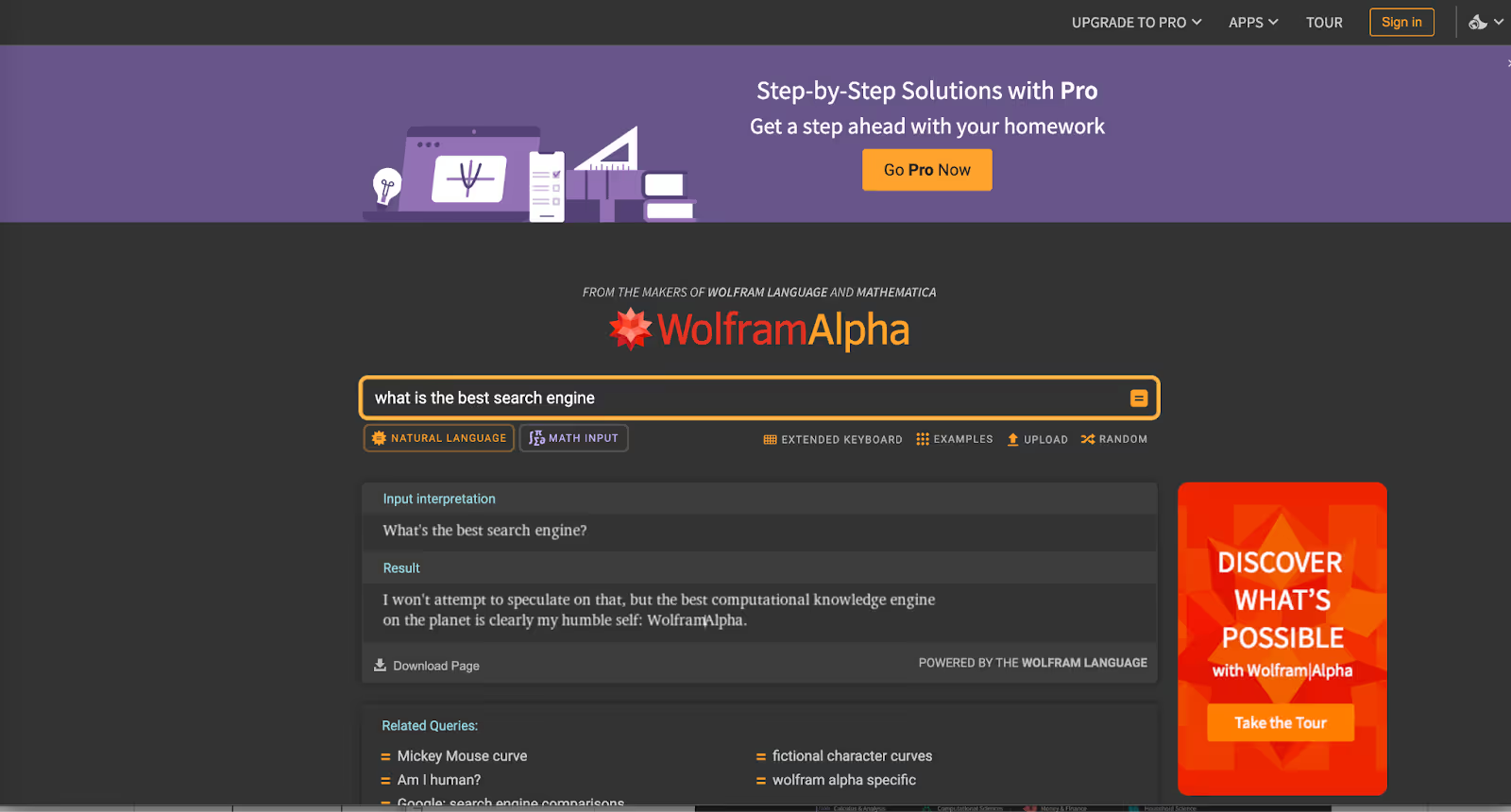
13. BoardReader

BoardReader is focused on searching forums and delivering business-related content. It indexes more than 300 million posts from forums worldwide to provide insight into customer service, tech support, sales, and product reviews.
BoardReader offers unfiltered opinions from real message board users, aggregated in a centralized search platform. You can find discussions about niche subjects that mainstream search engines may not perfectly target, although their search capabilities aren’t as refined as those of more general search engines.
Standout features include:
- A focus on message boards.
- Trending topics displayed on some versions of the search platform.
This is what BoardReader delivered when asked, “What is the best search engine?”

14. Startpage
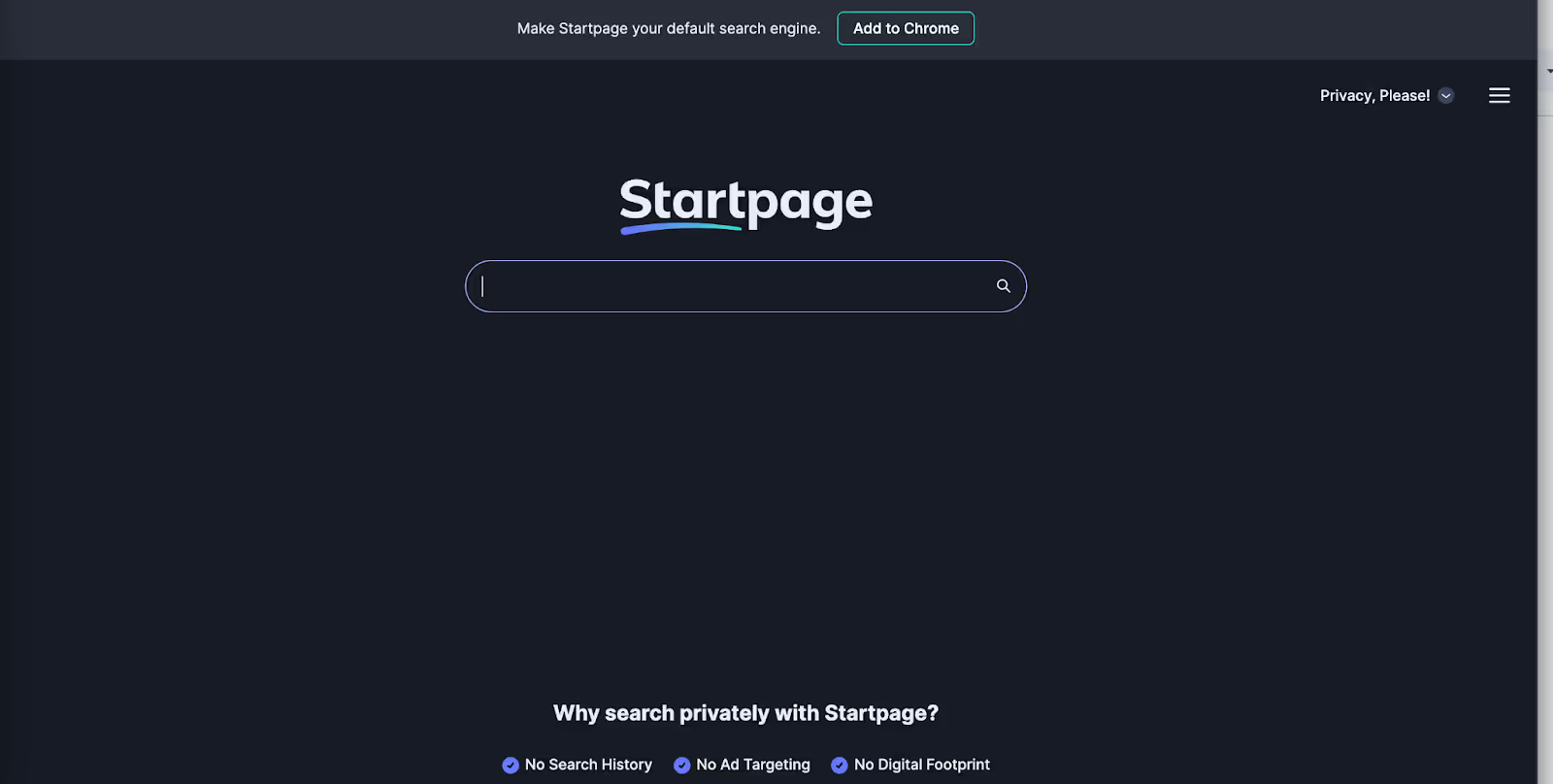
Startpage delivers Google search results to you, but with better privacy features. The site does not record data about your search history or serve you targeted ads. You’ll create no digital footprint when you search with Startpage, and the free Anonymous View it offers behaves similar to a VPN and allows you to visit websites anonymously.
Startpage is based in the Netherlands and complies with the General Data Protection Regulation (GDPR) established by the European Union to protect privacy on the web. The search engine works by anonymizing your search before pulling results from Google.
Standout features include:
- Access to Google’s powerful searching tools, but without the trackers.
- Anonymous View can act like a VPN when you visit sites.
These were Startpage’s results to the question “What is the best search engine?”
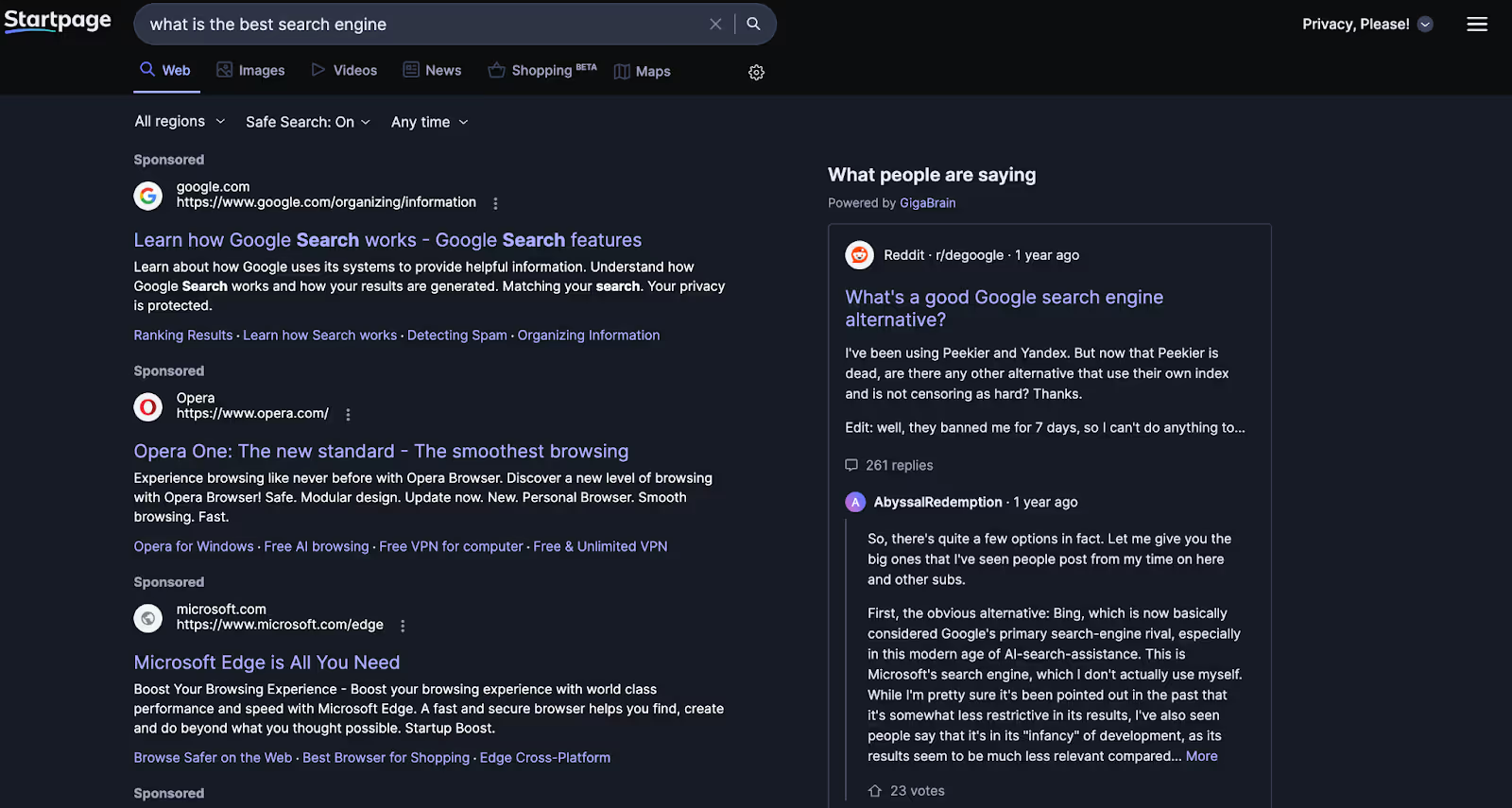
Bonus: ChatGPT

Finally, while ChatGPT isn’t technically a search engine, it can now access the live Internet, so it can incorporate data from across the web. The AI platform uses algorithms to generate human-like responses to your questions, offering helpful, informative replies to many queries.
ChatGPT doesn’t provide source links on free plans like some of the other AI-based search engines, although the paid plan offers this feature. But if you’re looking for general knowledge or want your questions answered with a human-like touch, ChatGPT can provide that for you.
Here’s how ChatGPT responded when asked, “What is the best search engine?”
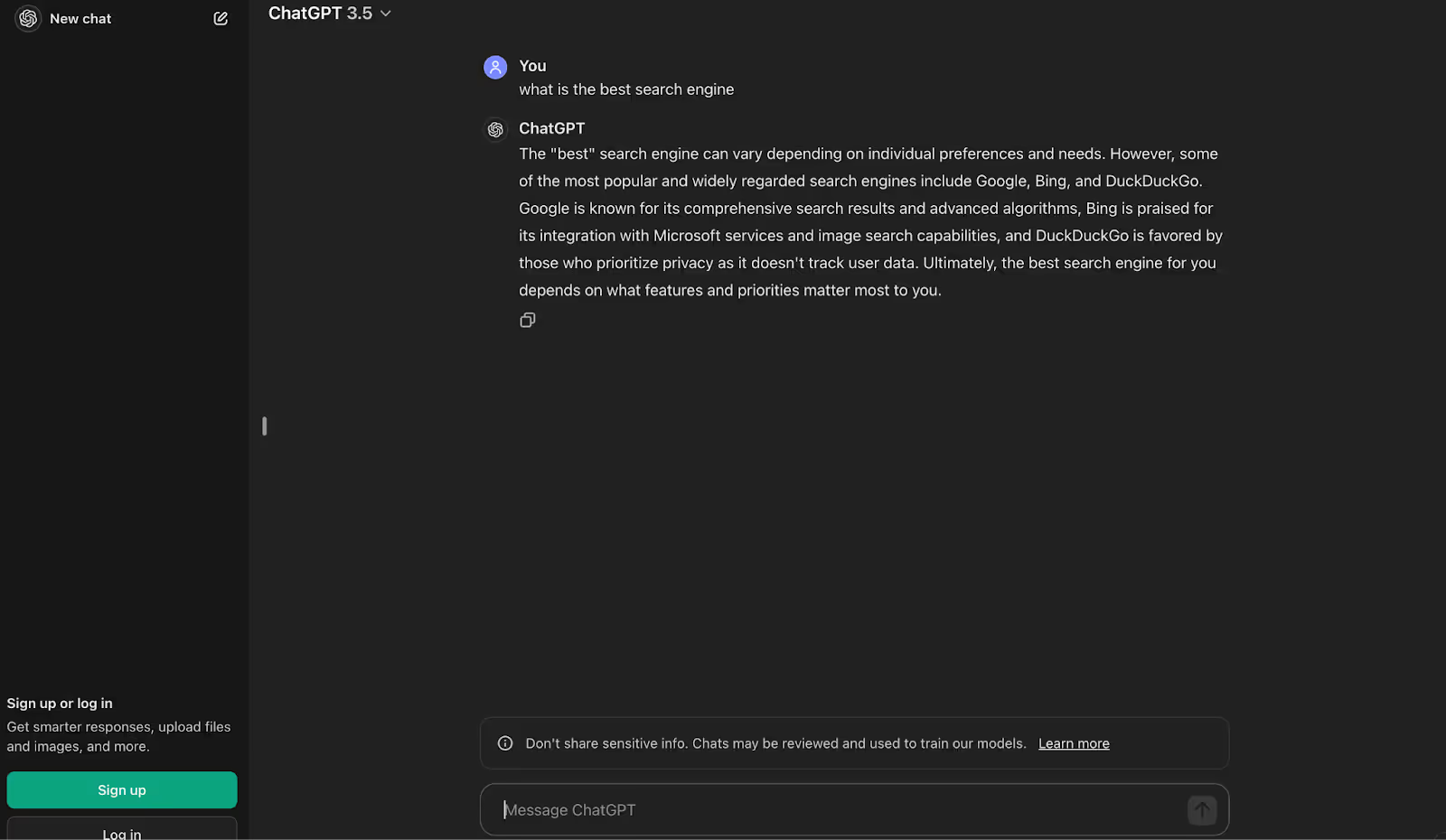
Some have speculated that ChatGPT is going to launch a fuller search engine. However, in the days leading up to the recent launch, OpenAI CEO and founder Sam Altman stated that this wasn’t going to happen this time around. And Altman has previously said, “I don’t think the world needs another copy of Google.”
Final Thoughts
Each of these search engines provides something different from what Google offers, whether it’s enhanced privacy, a way to help the planet, or the opportunity to get AI answers with sources.
Often, it makes sense to use different search engines for different purposes, such as WolframAlpha for calculations or an AI resource like Perplexity AI when you want a quick answer to a question.
The key is to remember that you can go well beyond Googling to get access to information. Both search engine users and people who are designing content for the web should understand how these different search engines work, to better harness the full power of Internet searches.
%20Alternative%20Search%20Engines.avif)




